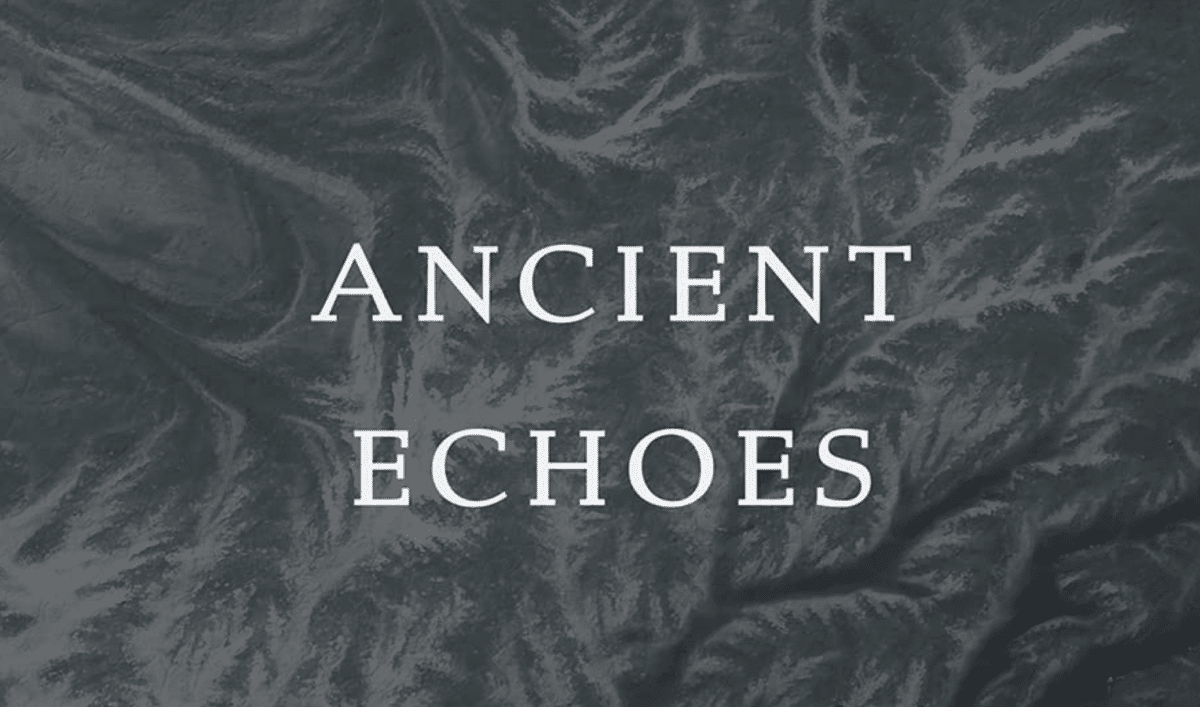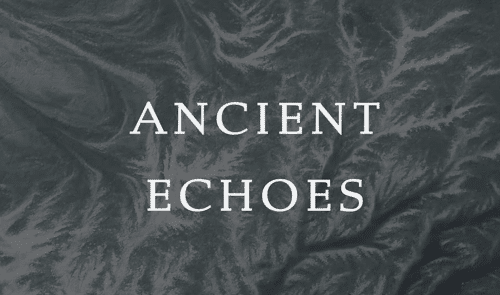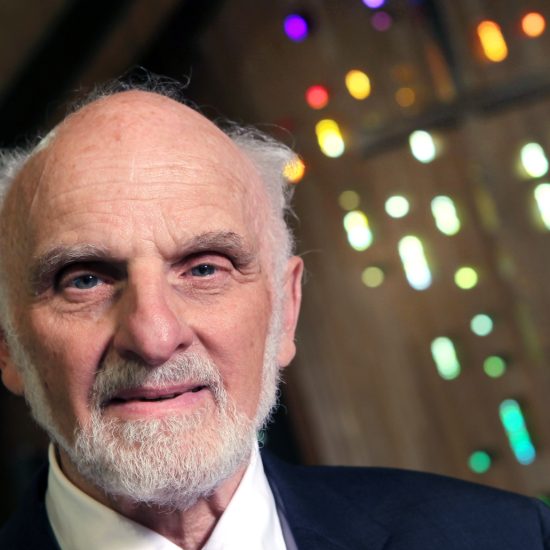

ANCIENT ECHOES: Refusing the Fear-Filled, Greed-Driven Toxicity of the Far Right. By Walter Brueggemann. Minneapolis, MN: Fortress Press, 2023. Xii + 132 pages.
I confess that I lean politically and theologically to the left. I also confess to being concerned about the political and the religious toxicity that I find to be present in the far right of the nation’s political spectrum. I should note that the political and the religious dimensions are for the most part intertwined on the far right, though I believe it’s the political that drives the religious dimensions. When it comes to speaking to this toxicity there are few persons alive today who have the gravitas to speak directly to these concerns and do so by responsibly by drawing upon the Bible than Walter Brueggemann. That gravitas is present in Brueggemann’s new book Ancient Echoes. Back in the day (17th century), this book would be called a broadside. It’s brief, to the point, and calls for action. We see the message clearly presented in the subtitle: “Refusing the Fear-filled, Greed-driven Toxicity of the Far Right.” Need I say more (I will, but you get the point).

Robert D. Cornwall
Walter Brueggemann is well known to many of us, especially Mainline Protestant clergy, but even evangelical and Roman Catholic folks will know his name and his work. Now retired, he served as the William Marcellus McPheeters Professor of Old Testament (now emeritus) at Columbia Theological Seminary (Georgia). While much of the Brueggemann materials being released recently are new editions and repackaging of earlier works, Ancient Echoes is new material. It speaks, as many have come to expect from Brueggemann, directly to the current climate we find ourselves in, a climate that is fear-based. Specifically, it speaks to ideologies and efforts that are rooted in appeals to fear of the other, the one who is different. When we encounter such fear-based efforts, we need a tonic that can break its hold. Again, there are few who are better equipped for this than Walter Brueggemann.
As noted, Ancient Echoes is subtitled Refusing the Fear-Filled, Greed-Driven Toxicity of the Far Right. The chapters of this relatively brief book (132 pages of text plus a brief preface). The book itself is small in size, making it a relatively quick read. While I say that, the reader will need to pay close attention to the words because the message is extremely important.
The contents of Ancient Echoes are based on a series of blog posts that Brueggemann wrote for the blog platform churchanew.org. The first eight chapters serve as a reflection on proposals made by Kurt Anderson in his book Evil Geniuses: The Unmaking of America (published in 2020). Brueggemann writes in his preface that Anderson provides a roadmap of sorts “for the history, ideology, and intent of the right-wing as a political force among us” (p. ix). In responding to Anderson’s theses concerning the implications of the right-wing efforts, Brueggemann, as those who know his work might expect, draws from Scripture, especially the Hebrew Bible, to extend the message of Anderson’s book. His expectation is that Scripture can provide an alternative vision of social well-being. Even as he draws from the wisdom found in Scripture, he believes that the communities who draw from that well are called and authorized to speak out against this right-wing ideology. He writes that synagogues and churches “have a deep stake in the flourishing of democracy, and a solid reason for refusing and resisting the propensity of fascism that wants to reduce political influence to the privileged and entitled few” (pp. x-xi). Thus, this small book is offered as a word of encouragement to these communities to speak out and address important issues of our day such as racism, sexism, immigration, sexual orientation, and more.
In the course of the book, Brueggemann speaks to eight principles that can guide our response to this climate of fear and greed. The first principle serves as a response to the right-wing suggestion that government is bad. He does this by suggesting that the solution to bad government isn’t no government but good governance. While not all government is good, neither is it all bad. The challenge for us is to distinguish between good and bad government and work to make sure that good government exists. He points out how, especially in the Old Testament, the prophets speak of the relationship between sheep and shepherd. The call here is for a government that is not predatory and that cares for the sheep.
The second principle addresses the claim made by the far right, a claim which Anderson details and Brueggemann refutes, concerns the “belief in our perfect, mythical yesteryear.” Consider the message of the Trumpist slogan “Make America Great Again.” It is a message that hearkens back to a different supposedly golden age when things were different. What did that golden age involve? It was a time when white men were in control! Again, Brueggemann draws on the prophets, such as Amos and Isaiah, who challenge this longing for yesterday. Instead of pining for the past when white men were in control, Brueggemann reminds us of the message that God is always making things new. Thus, “God’s truth is marching on, and all of our illusionary nostalgia will not stop that march toward justice, peace, and freedom by way of mercy and compassion” (p. 24).
Moving on we encounter the third and fourth claims made by the right wing. According to this claim, the “establishment experts are wrong, science is suspect.” According to the third claim, it’s the doctors that are suspect and wrong. Once again Brueggemann addresses the claim by drawing on Scripture, especially Wisdom Literature, including Proverbs as well as non-canonical texts like Ben Sirach. Helpfully, we hear the call of Ben Sirach to honor physicians and pharmacists, respecting their skills. The fourth claim builds on the third, in that it suggests that science is suspect. Whether it is COVID or Climate Change, we’re constantly hearing that the “experts” are wrong. Thus, Brueggemann writes that “the dismissal of reliable knowledge leads to unrestrained speculation. That, in turn, is readily open to conspiracy theories that do not need to be, or cannot be, fact-checked” (p. 41).
As we turn to the fifth claim of the far right, we encounter economic issues. Here the focus is on elevating short-term profits. We see this daily in efforts to manipulate things so that short-term gain can be achieved at the expense of people and the environment. This is where greed drives the conversation. While he notes there are numerous texts that address this situation, he chose to draw from Jeremiah, who speaks of the scoundrels who have become great and rich and “know no limits in deeds of wickedness” (Jer. 5:26-29).
We move to the sixth claim that “liberty equals selfishness.” We often hear about American individualism in defense of so-called rights such as unlimited gun ownership (in the name of the Second Amendment). Or perhaps it’s my right to not receive a COVID vaccine that would not only protect me but others as well. It’s my body, the saying goes (unless you’re a woman seeking an abortion). Brueggemann, this time drawing from the Gospels, reminds us that church people should know that “liberty is not and cannot be selfishness, that accumulation does not work, that anxiety does no good, that greed never succeeds, and violence has no future” (p. 82). In other words, we can’t be self-sufficient. We need each other!
The seventh claim involves inequality, which the right says isn’t so bad (let us take note here of the efforts to get rid of DEI — Diversity, Equity, and Inclusion). Inequality may be part of our reality, at least to this point in history, but it’s not something we should celebrate (and yet many on the right do exactly this). That truth revealed throughout scripture, addresses inequality. Brueggemann points to the Exodus story of God’s provision of manna. According to that story, the people couldn’t store it up (hoard). There was enough for all, whatever the need. Or, consider the story of the feeding of the 5000. Again, people received what they needed, and all were filled. Of course, not everyone was happy because they didn’t understand the message of the bread. What did they misunderstand? Because their hearts were hard their hearts were “not open to the generous assurances of God” (p. 102).
The final claim made by the right is that “Universal Health Care is tyranny.” Here it is a matter of taxes, which need to be collected to support universal health care. Those on the right claim that not everyone is deserving of good health care — only those who have the funds to get it are worthy of good health care. So, we often hear about the undeserving receiving health care (Medicaid?). Yet, throughout Scripture, we hear about people being healed without cost. Elisha didn’t charge Naaman. Jesus didn’t charge anyone for healing. Neither did Peter or John or even Paul. As we ponder these stories of healing, we need to ask whether good health care is a right that is due to everyone.
Having examined and addressed these eight claims examined, all of which Brueggemann, finds to be faulty in accordance with his reading of Scripture (and you know that Brueggemann has expertise here), Brueggemann uses chapter nine of Ancient Echoes to restate the eight proposals/responses to the claims made by the right, as detailed by Anderson, in his book Evil Geniuses. While Brueggemann doesn’t believe much is to be gained by making arguments against these right-wing claims, he does believe that the church can and should begin developing an alternative witness and practice when it comes to these claims. These claims made by those on the far right (many of whom claim to be good Christians) are, in Brueggemann’s mind, and rightfully so, contrary to the ways of Jesus. Therefore, he believes that we, as followers of Jesus, should take a different course of action. Those who have heard Brueggemann speak or read his books know that he has a prophetic edge. He is direct in his words, and that is true here in Ancient Echoes, a book that speaks clearly to the issues of our time, reminding us that Scripture is not the possession of only those on the right!
This review originally appeared on BobCornwall.com.
Robert D. Cornwall is an ordained minister in the Christian Church (Disciples of Christ). Now retired from his ministry at Central Woodward Christian Church (Disciples of Christ) of Troy, Michigan, he serves as Minister-at-Large in Troy. He holds a Ph.D. in Historical Theology from Fuller Theological Seminary and is the author of numerous books including his latest “Second Thoughts about the Second Coming: Understanding the End Times, Our Future, and Christian Hope” coauthored with Ronald J. Allen. His blog Ponderings on a Faith Journey can be found at www.bobcornwall.com.






